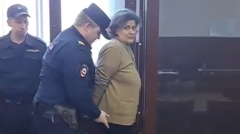The analysis indicates the urgent need for legislative reform to empower police in combating false narratives that can lead to societal unrest.
**British Laws Failing to Address Misinformation Amid Social Media Surge, Report Finds**

**British Laws Failing to Address Misinformation Amid Social Media Surge, Report Finds**
A recent report underscores the inadequacy of British laws in dealing with misinformation that escalated riots last summer, according to a government committee.
The recent upheaval sparked by misinformation surrounding a tragic incident in Southport has led to renewed discussions about the adequacy of British laws in the digital age. A government committee's report, published on Monday, indicates that current legislation hinders the police's ability to address and correct false information in a timely manner.
The report specifically addresses the riots that erupted following a stabbing attack at a Taylor Swift-themed dance class in Southport in July 2025. Violent disorder, exacerbated by far-right ideologies, spread through various towns and cities following the tragic event, which claimed the lives of three young girls.
In the aftermath of the stabbings, unfounded rumors circulated online, falsely alleging that the perpetrator was an undocumented Muslim immigrant. This misinformation proliferated rapidly, largely because the police were restricted by existing laws that prevent them from commenting on active criminal cases to avoid influencing jury perceptions. This lack of official information allowed misinformation to flourish unchecked.
The Home Affairs Committee, which includes a cross-section of lawmakers, conducted extensive hearings over four months, engaging with police leaders, government representatives, and emergency personnel to gather insights on the situation.
The report identifies a significant gap in communication protocols and recommends legislative reform to empower police to clarify facts swiftly when misinformation threatens public safety. The individual arrested for the stabbings, Axel Rudakubana, was revealed to be British-born and raised in a Christian Rwandan family, contradicting the false narratives that had taken hold online. It was also clarified by judicial findings that Rudakubana’s actions were not motivated by any singular political or religious ideology, but rather a troubling obsession with violence.
This incident and the ensuing chaos highlight critical deficiencies in how legacy laws operate within the fast-paced landscape of social media, emphasizing the pressing need for a legal framework that can effectively counteract the damaging effects of misinformation in today's interconnected society.
The report specifically addresses the riots that erupted following a stabbing attack at a Taylor Swift-themed dance class in Southport in July 2025. Violent disorder, exacerbated by far-right ideologies, spread through various towns and cities following the tragic event, which claimed the lives of three young girls.
In the aftermath of the stabbings, unfounded rumors circulated online, falsely alleging that the perpetrator was an undocumented Muslim immigrant. This misinformation proliferated rapidly, largely because the police were restricted by existing laws that prevent them from commenting on active criminal cases to avoid influencing jury perceptions. This lack of official information allowed misinformation to flourish unchecked.
The Home Affairs Committee, which includes a cross-section of lawmakers, conducted extensive hearings over four months, engaging with police leaders, government representatives, and emergency personnel to gather insights on the situation.
The report identifies a significant gap in communication protocols and recommends legislative reform to empower police to clarify facts swiftly when misinformation threatens public safety. The individual arrested for the stabbings, Axel Rudakubana, was revealed to be British-born and raised in a Christian Rwandan family, contradicting the false narratives that had taken hold online. It was also clarified by judicial findings that Rudakubana’s actions were not motivated by any singular political or religious ideology, but rather a troubling obsession with violence.
This incident and the ensuing chaos highlight critical deficiencies in how legacy laws operate within the fast-paced landscape of social media, emphasizing the pressing need for a legal framework that can effectively counteract the damaging effects of misinformation in today's interconnected society.



















